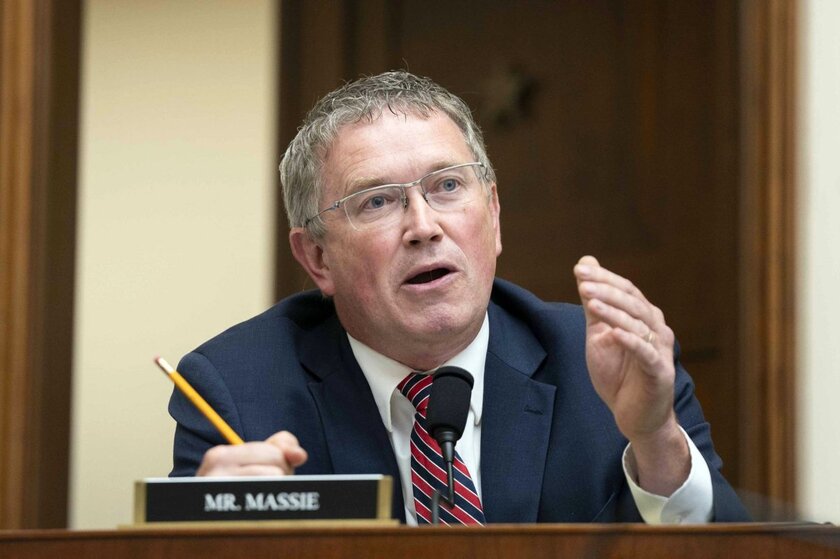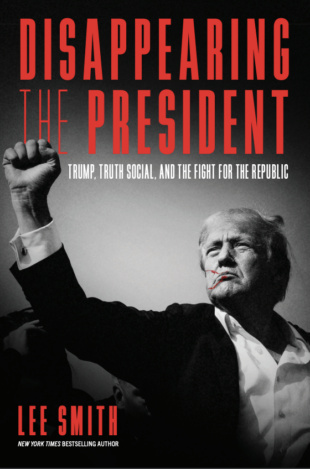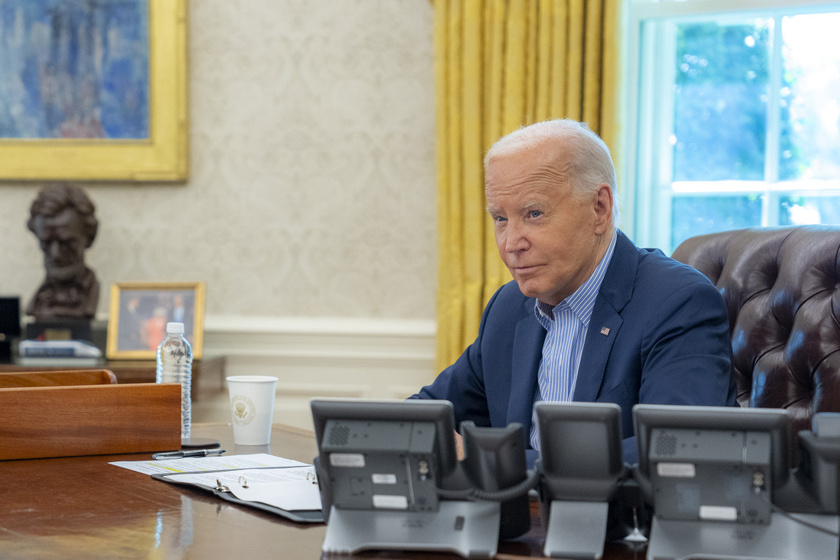
Kentucky Congressman Thomas Massie revealed in a recent interview that Republican lawmakers all have their own handler from the American Israel Public Affairs Committee. “It’s like your babysitter,” said Massie. “Your AIPAC babysitter who is always talking to you for AIPAC. They’re probably a constituent in your district, but they are, you know, firmly embedded in AIPAC.”
That sounds scary — a Washington lobby wrangling votes to win its policy preferences. What makes it even more suspicious is that even though AIPAC members across America are, as Massie explained, in touch with every GOP lawmaker, no one outside of the Beltway seems to know about it. “Why,” asks the congressman, “would [Republican House members] want to tell their constituents that they’ve basically got a buddy system with somebody who’s representing a foreign country? It doesn’t benefit the congressman for people to know that. So they’re not going to tell you that.”
Massie is understandably mad at AIPAC. The pro-Israel outfit backed his primary candidate largely because he’s against sending military aid to Israel. Good on Massie for voting his conscience, but that doesn’t change the fact he’s also voting against the Republican base and the leader of the party. Donald Trump says that Israel should have everything it needs to destroy Hamas, and quickly. If you’re a Republican and you want to cut off aid to Israel at present, you’re taking sides against the leader of your party.
Going against AIPAC, of course, is something else. Lots of senior Republican officials have challenged AIPAC of late because over the last few years it’s essentially become a Democratic Party shop. That wasn’t always the case.
Contrary to what anti-Israel conspiracy theorists say, AIPAC doesn’t drive US Middle East policy, US policymakers do. Insofar as AIPAC is powerful, it drafts on a relationship that was conceived to augment American power and is supported by the voting public.
With its victory in the October 1973 war, US officials began to see Israel as a pillar of America’s security architecture in the Middle East. Among other things, Israel helps stabilize the eastern Mediterranean. Imagine if Iran, through its proxies Hamas and Hezbollah, controlled the coastline giving it a choke point to extort shipping passing out of the Suez Canal.
We’re watching a version of that scenario play out in the Red Sea, where for half a year the Iran-backed Houthi rebels have been firing missiles at cargo ships, forcing big shipping firms to redirect traffic and disrupting the global supply chain. If the US wants to keep the Red Sea stable, it’s left to Washington to deploy resources to make it so.
At present, the Joe Biden administration prefers to appease Iran rather than protect shipping lanes crucial to American peace and prosperity. But thanks to Israel, that’s not an issue in the eastern Mediterranean. Paying allies to do work that advances your interest cuts costs in blood and treasure, which is why it has been a crucial instrument of foreign policy for thousands of years.
The fact is that AIPAC has lost several important fights in Washington, most recently, and most significantly, over Barack Obama’s 2015 nuclear agreement with Iran. Most Americans opposed legalizing the nuclear weapons program of a rogue state with American blood on its hands, so it’s hardly surprising that an organization advocating for the US-Israel relationship was against arming an obscurantist theocracy threatening to wipe the Jewish state off the map. Yet, as hard as AIPAC tried, the nuclear deal was Obama’s key foreign policy initiative and there was nothing AIPAC, nor pro-Israel US lawmakers, could do to stop it.
By realigning US interests with an Iranian terror state that embodies antisemitism, Obama’s nuclear deal also reconfigured the Democratic Party at the expense of pro-Israel centrists. Elevating Iran and its proxies privileged the progressive faction, Obama’s faction.
Over the last few days, we’ve seen what that looks like as pro-terror cadres have enjoyed free run of Washington, DC. There will be no consequences, no arrests for their vandalism and violence in the capital because their actions advance the causes of the progressive regime.
Thus, the Iran deal also shifted the Overton window on bipartisanship and weakened AIPAC, which Obama planned on. Since the pro-Israel lobby can generally count on Republican lawmakers to support Israel, AIPAC’s role in the post-Obama era is to lobby for the policies of the Democratic president, whether those are good for Israel or not, by getting Republicans on board.
For instance, AIPAC lobbied on behalf of the Biden administration’s foreign aid package even though the purpose of tying Israel aid to Ukraine funding was to poison Israel on the right. So, Sen. Ted Cruz went against AIPAC and pushed for a separate bill with only Israel funding. Not surprisingly, every Senate Democrat voted against Cruz’s bill. Somewhat surprisingly, AIPAC retaliated by halting fundraising efforts for him — the most pro-Israel legislator in Washington. Weird stuff, but that’s AIPAC after Obama.
The crucial point is that Cruz went against AIPAC, not Israel and not Trump. Given that the Democrats have spent the last eight years opposing the GOP leader on everything, opposing Israel aid is structurally a pro-Obama move.
Massie’s admirers would argue that the quirky, MIT-educated scientist isn’t pro-Obama but a real conservative who is always going to vote against sending money to any foreign power. Maybe so, but it’s not clear why an elected official entrusted with US national security deserves credit for failing to distinguish between funding for, say, Ukraine, fighting a proxy war on the border of a nuclear-armed power, and Israel, fighting anti-US terror organizations backed by the Islamic Republic of Iran.
There are solid America First reasons to vote against US military aid to Israel but refusing as a matter of principle to fund an ally who is shedding its own blood to do what Biden won’t and rescue American hostages is not one of them.
Jacob Siegel and Liel Leibovitz wrote an important article for Tablet last July arguing why Israel should stop taking US aid. They reasoned that dependence on Washington might leave Jerusalem vulnerable should the White House condition aid to prevent Israel from advancing its interests. With Israel’s war in Gaza, Liel and Jake’s concerns have been realized as the Biden administration has withheld resupplies, slowed down military operations, and limited Israel’s efforts to re-establish deterrence after a massive Iranian missile and drone attack. Because tying the country’s security to the US may in time compromise its sovereignty, they argue that Israel, a much wealthier country now than it was half a century ago, can and must go it alone.
Freeing Israel from the constraints of a US administration that has been working for eight months to save Hamas is also in the US national interest. It may be different for the Obama faction, but most Americans, including Democrats, agree that it’s a good thing when anti-American terrorists are stopped.
And liberating Israel from US progressives is an effect of what may be the best conservative argument for opposing aid to Israel — to stop Democrats from using taxpayer money to build Democratic Party colonies abroad. Democrats have infiltrated Israel’s military establishment to such an extent that some in its top echelon are effectively clients, like former defense minister Benny Gantz. His decision to resign from Prime Minister Benjamin Netanyahu’s government was reportedly taken in consultation with the Biden White House for the purpose of collapsing the coalition in the middle of a war.
Because the Democrats see foreign policy simply as another venue to fight their domestic opponents, the best conservative case for stopping Israel aid is in essence to weaken the Obama faction by halting the march of progressive empire. It’s the same reason conservatives might want to block US aid to, say, Hungary, or El Salvador, or Argentina — to prevent progressives from using American money to exercise leverage on world leaders fighting to preserve their national sovereignty.
But containing globalism probably isn’t why Massie expresses alarm that the pro-Israel lobby of US Jews tasks members in his district, his constituents, to ask him to support the US-Israel relationship. Or does he also think it’s disconcerting that members of Christians United for Israel, the largest pro-Israel organization in the US, ask for meetings with Republican lawmakers when they visit Washington?
Massie, who has served in Congress since 2012, must understand that this is how all lobbies work. As a strong defender of the second amendment, Massie knows that the NRA and other pro-2A outfits urge members to call and write their Senators and Representatives imploring them to vote in line with the organizations' preferences.
AIPAC does the same, flooding the offices of Republican lawmakers with calls and letters from constituents petitioning their elected officials to support their cause. That’s normal in Washington. What’s not normal is framing it like a secret conspiracy.

















